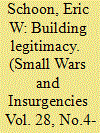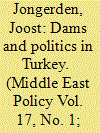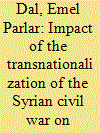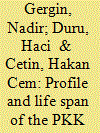| Srl | Item |
| 1 |
ID:
153612


|
|
|
|
|
| Summary/Abstract |
Previous research has identified a variety of general mechanisms to explain how insurgents build legitimacy. Yet, there is often a gap between these mechanisms and the interactional dynamics of insurgencies. This article attempts to bridge this gap through a theoretically informed analysis of the Kurdistan Workers’ Party’s (PKK) insurgency in Turkey. I show how the PKK’s efforts to cultivate legitimacy, Turkey’s counterinsurgency strategies, and civilian perceptions of the PKK, all mutually influenced one another. Based on this analysis, I argue that the mechanisms that produce popular legitimacy coevolve with insurgents’ behaviors, states’ interventions, and civilians’ perceptions.
|
|
|
|
|
|
|
|
|
|
|
|
|
|
|
|
| 2 |
ID:
095609


|
|
|
| 3 |
ID:
153883


|
|
|
|
|
| Summary/Abstract |
This article examines how Turkey was affected by the conflict spillover effects of the Syrian civil war and its escalation in the last two years with the rise of the Islamic State in Iraq and Syria (ISIS) threat and the changing nature of the Kurdish insurgency. It seeks to assess the degree of the transnationalization of the Syrian civil war and its spread to Turkey by employing a theoretical framework borrowed from the conflict clustering literature. The first part will introduce the dual-embedded theoretical framework with its division of conflict spillover effects as “intentional” and “unintentional”. The second part tries to apply this dual-track framework to the Turkish case and, thus, seeks to test the conflict spillover factors on Turkey. The third part focuses on the two specific and major spillovers of the Syrian civil war, the ISIS threat and the rise of an embedded Kurdish insurgency, namely Democratic Union Party (PYD or Partiya Yekîtiya Demokrat)-Peoples Protection Units (Yekîneyên Parastina Gel or YPG)/Kurdistan Workers Party (Partiya Karkerên Kurdistanê or PKK), and explains the conflict spillover processes of these two case studies under a triple framework, origin, diffusion and escalation and with reference to the division between intentional and unintentional spillover effects.
|
|
|
|
|
|
|
|
|
|
|
|
|
|
|
|
| 4 |
ID:
144868


|
|
|
|
|
| Summary/Abstract |
This study analyzes the impact of the Turkish Repentance Laws in undermining the Kurdistan Workers Party (PKK). Did the repentance laws increase the PKK surrender, thereby decreasing the PKK violence? Vector Auto-Regression analysis indicates that enactment of repentance laws did not have any significant impact on PKK surrenders, failing to significantly decrease PKK violence. Yet it does not establish any meaningful relationship between the use of force and PKK surrenders. Descriptive analyses show the significant number of surrenders took place in 1993–94, 2001, and 2003, while the highest number of penitents submitted to the “Return to Home Law” in 2003. These values relate to a specific context. This study, however, asserts that surrendered and applicant PKK members were too few to influence the overall conflict, concluding that, in addition to what these laws mean to the penitents, the success/failure of repentance policies are related to the nature of Turkey's counterinsurgency and their respective context.
|
|
|
|
|
|
|
|
|
|
|
|
|
|
|
|
| 5 |
ID:
137170


|
|
|
|
|
| Summary/Abstract |
This study attempts to explore the span of a life in a specific terrorist organization, the Kurdistan Workers Party (PKK). It suggests the following: The average lifespan of a person in the PKK is about two-and-a-half years (i.e., not a very long one). Females join the PKK at a younger age (about 1.4 years) and die at a younger age (about 1.4 years) compared to males, but their lifespan is not any different than that of males. The age at which a PKK member joins the organization, and the age at which (s)he dies varies by year. The age at which a PKK member joins the organization, and the age at which (s)he dies varies by where (s)he comes from. Still, another interesting observation is that the average lifespan of a PKK member varies by where (s)he comes from.
|
|
|
|
|
|
|
|
|
|
|
|
|
|
|
|
| 6 |
ID:
121523


|
|
|